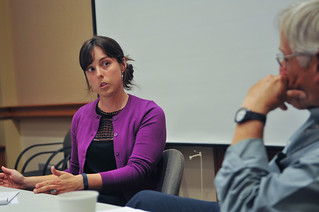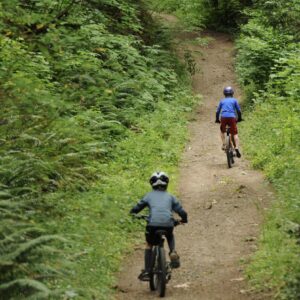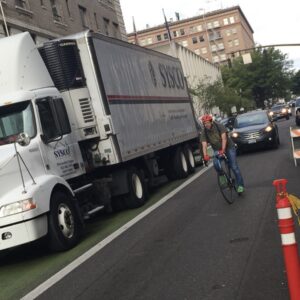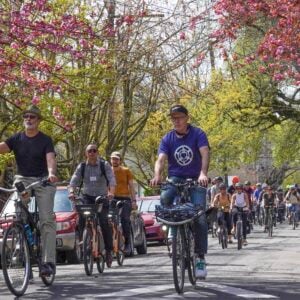
Advisory Committee meeting back in September.
(Photo © J. Maus/BikePortland)
Four months after it officially launched, Portland’s Off-road Cycling Master Plan is getting started in earnest. Yesterday the city released a more detailed project scope and opened the application period for the project’s advisory committee. Back on October 12th, the city chose a project consultant (Toole Design Group) that will be tasked with managing the public engagement and planning.
Michelle Kunec-North, the bureau of planning project manager overseeing the plan, spent all summer talking to interest groups and organizations. Her goal with that initial outreach was to better understand the lay-of-the-land, both figuratively and literally.
“Now the idea is to zoom out with a wide lens and set up a system plan for where these facilities might be, what they might look like and who they might serve,” Kunec-North told members of the Bureau of Transportation’s bicycle advisory committee back in September.
To help answer those questions the city is looking for 15 people who want to serve as representatives of the community and sit on the Project Advisory Committee. Here’s who they’re looking for:
Advertisement
- Trail and park users.
- Portlanders with interests, skills, knowledge and expertise in off-road cycling, environmental stewardship, trail design or management, outdoor recreation, business, tourism and health.
- Members who might be able to contribute perspectives or experiences from historically under-represented or under-served communities, such as communities of color, Portlanders with limited-English proficiency, low-income residents, youth, and Portlanders with disabilities.
- The City is particularly interested in members who can bring and consider multiple perspectives and who can think creatively about off-road cycling opportunities citywide.
Anyone interested in this committee needs to have an application in by November 18th.
From what we’ve heard so far from Kunec-North, this plan will look at all types of facilities — not just singletrack. And it’ll also tackle what she has repeatedly said are the two biggest issues they’ve heard from the community: off-road cycling’s potential impacts on the environment and interactions with other users of parks and natural areas.
If all goes well, a draft Master Plan should be in front of City Council about a year from now. Stay tuned for announcements of the first public meeting and open house.
Learn more at the official project website.
— Jonathan Maus, (503) 706-8804 – jonathan@bikeportland.org







Thanks for reading.
BikePortland has served this community with independent community journalism since 2005. We rely on subscriptions from readers like you to survive. Your financial support is vital in keeping this valuable resource alive and well.
Please subscribe today to strengthen and expand our work.
I hope they don’t let Houle/Blaize et. al. sit on this committee for once – would be nice to see some fresh faces, we already know what they think.
Unfortunately I get the feeling these people have too much time on their hands and actually enjoy the process of obstructionism at board meetings. I’m hoping for the best however. Sure would be nice to be able to move back to my hometown.
The problem is that they view themselves are crusaders and martyrs for their cause.
Mountain biking is transportation.
Mountain biking is a conveyance, and therefore it is transportation. The purpose of that conveyance is recreation.
The purpose can also be solely for mobility in some cases. I know some people that used to commute through Forest Park.
They are not mutually exclusive.
This. I commute from NE PDX to Beaverton through Washington Park. Man, I would love to be able to get off of the road and ride trails instead! The less pavement the better.
http://www.bikeradar.com/us/beginners/news/article/colorado-town-approves-singletrack-sidewalks-42979/
An easy way to get more in-city off-road trails is to vacate some streets and turn them into extremely wide, multi surface biking and walking paths.
I nominate my street and the one next to it 😉
SW Florida Street in the 46th block of SW has been vacated despite the objections of SW Trails and Oregon Walks.
I’m not very familiar with SW – can you explain why SW Trails didn’t want the street vacated?
The church there wants to make it into a private street. There are acres of parking between the two churches there, across from the SW Community Center.
http://swtrails.org/2014/02/24/monthly-general-meeting-minutes-and-annual-meeting/
http://swni.org/5086
http://swni.org/CMS-Uploads/SW46th_FloridaSt.Vacation.WPC_.Letter062811.1.pdf
Vacating a public right of way is to return it to the adjacent private property owner. This removes it from any future public use, like a trail.
The issue of environmental impacts is a red herring and should be dealt with early in this process. Biking has no more potential impact than any other type of use, if it is managed correctly.
In order for the plan to be successful, and able to be implemented, the BPS team and the consultant MUST examine and address the existing structural barriers (e.g. existing city code, master plans, etc.). Without modifying these, this plan is just another failed attempt that will sit on a shelf collecting dust.
This is way overdue. We’ve suffered through piecemeal attempts to address the dearth of off-road opportunities in and around the City. Let’s hope the City has the will to see it through to a successful completion.
Not a red herring, but pivotal to the discussion. Once it is established that well designed and properly used Mt biking causes no harm, THEN the barriers could fall.
I have hope that when those well designed mountain bike trails prove to be successful that the extremely poorly designed existing hiking trails will be closed to everyone and that the hiking groups have to spend their time defending themselves against the same kind of specious attacks mountain bikers have for the last 20 years. It seems the magnifying glass has been too narrowly focused.
Bitter much? Contributing to the us vs. them conflicts will not well serve the goal of more mt. bike trails.
Nope, I’m not bitter at all. I’m just hoping that we get to see some equality when it comes to recreational standards on our community trails. If you’re going to set the bar high for sustainable trails they should apply to all the groups using them.
A well built trail, whether hiking or biking doesn’t need rubber diverters installed to reduce erosion. Yet that is what you see throughout the hiking trail system here in the PNW. A true indication of a poorly designed trail.
I’ll admit it, I’m bitter. And cynical, at this point. I want to apply for the committee, but I fear that all of my volunteered time will be for nothing. The FP Singletrack Com met for over a year. Nada. The RVNA Advisory Committee met quite a few times over a number of years. Nada. Why would I think that a City Councilperson isn’t going to come in and derail anything that is proposed by the group?
I hear and understand your cynicism, Brian. But there is at least one big difference this time around: The city (Hales) committed $350k to this MP process and it will be much harder to sweep that investment under the rug. Also, I think public awareness and sentiment after the (ongoing) River View fiasco won’t tolerate nearly as much of the lying and misinformation coming out of the anti-bike elitist.
I appreciate the optimism, TL.
The people who claim that mountain bike trails cause some sort of harm believe that because they want to believe that, not because of evidence. There are PLENTY of examples of successful urban mountain biking trails in the USA and plenty of those that are 5, 10, 15 or more years old. Many have shown a long history of having minimal impact to the environment and to those that use trails.
I live in a state where urban mountain bike trails are so normal that this past summer, two towns (Austin & Stillwater) had high schoolers propose, gain approval for and then build 3 to 4 mile trail systems. The former of which was added to the High School League Mountain Biking race schedule.
The idea that urban mountain biking trails have to prove anything is just bogus. It’s a group of people unwilling to look at the what exists, its history and how other places have made a success of urban mountain biking.
“…THEN the barriers could fall.” Grampa, the data is in, the analysis is done, the results are clear. Portland’s lack of off-road cycling opportunities has virtually nothing to do with legitimate environmental concern. It is driven almost entirely by fear and misinformation perpetuated by recreational elitist who are doing nothing more than trying to preserve their favored access to the public land. If you actually don’t understand this point, I encourage you to use google…or talk to a professional land manager.
It’s not environmental issues, it’s that mountain bikers and hikers don’t mix well. Let’s hear it for separate trails. And I am ready to help build that Mexico to Canada bike trail, what with all the pent up demand for bike packing.
I respectfully disagree. We mix well all over the place, including right here in Portland at Powell Butte. I have had MANY great interactions over the years with hikers around Mt. Hood, Bend, in Wisconsin when I visit family, and on and on. That being said, I am totally for separate trails and/or alternating day strategies if that seems to be the best compromise for a particular area. I, too, am ready to build.
“Hikers and bikers don’t mix well.” But that’s simply untrue on thousands of miles of recreational trails all over the country. Shared use trails are the highly successful standard. That’s not to say that ALL trails need to be shared use, but there’s no point in separating users and increasing environmental impact unless a specific situation calls for it. That’s part of what a Master Plan can help answer. What DOESN’T mix well are intolerant, recreational bigots who treat public trails like their private property and the rest of us who are perfectly capable of sharing and getting along just fine.
It has been pretty well established. You should do some additional reading on the science that has already been performed.
The city has found in their own studies that Dogs are a bigger problem than bicycles, the bans aren’t related to the facts.
This, so much. Metro explicitly bans dogs (but not bikes) from its natural areas for this reason.
http://www.oregonmetro.gov/parks/dogs-hunting-policies
I have a whole screed about how dog owners (I am one) have awesome access to Portland’s green spaces BECAUSE we are bad actors who flaunt exclusionary policies so egregiously that the city has no choice but to give us lots of access, just to keep us out of the most sensitive areas.
“flout” not “flaunt”
I went to college!
I have definitely advocated for more disobedience. The mountain bikers in this town have paid the price their obedience, that is for certain.
Yes, lets invent the wheel once again! Forget all of the communities that have already integrated mountain biking into their recreational infrastructure successfully. We need to prove once again that mountain biking can coexist with little children and wild animals in urban interface/open spaces. Forget about Boise, Sedona, Park City and about a hundred other places where they have been doing it for years. We need to start from scratch. Our pointy headed deep thinkers are sooooo much wiser than anyone else!
Cue the bird lovers and horse riders. It’s obvious that Portland would benefit from trails all over the place. Yet…they might get one or two.
Echoing Alex’s comment above, let’s hope that the advisory committee selection process filters out anyone who is plainly opposed to the mission of the committee and the goals of the Master Plan process. That would seem to be an obvious criteria that has been overlooked during the formation of advisory committees on this topic in the past.
By the way, is everyone paying attention to http://www.sustainabletrailscoalition.org?
What about it?
“What about it?”? It’s Portland’s trail and conservation issues on a grand scale.
A key point in the plan development likely is to be how Michelle Kunec-North and the committee members will recognize Forest Park, it’s unique legacy and long standing role as a nature park to Portland, and perhaps somehow reconcile that with the desire of mountain bike enthusiasts to use Forest Park for mountain biking.
As fun as some people find mountain biking to be, and though its style of riding range from the very mild, easy going family type riding, to the very athletic, aggressive type of riding, with variations in between, bottom line is that mountain biking is ‘vehicular recreation’, making that mode of travel inherently contrary to and at conflict with the role by which this singularly extraordinary urban nature park serves the city’s residents.
Will the committee find or decide it’s able to acknowledge and honor the interests of both…the park’s unique legacy and role to the city…and the desire of mountain bike enthusiasts to use that park for mountain biking…to the extent that the city’s mayor and commissioner’s will feel able to confidently approve the use of that park for mountain biking? Regardless of who is assigned to the panel, it seems likely that these are things the city will be considering.
> making that mode of travel inherently contrary to and at conflict with the role by which this singularly extraordinary urban nature park serves the city’s residents.
To your definition of “urban nature park”. Mountain biking is a passive sport which is exactly what Forest Park was meant for.
The majority of Forest Park users who showed up to vote, wanted more single track mountain bike access. Don’t go confusing your opinions with what the public says. You continuously do this and I wish you would be moderated out for saying the same lies over and over again.
wsbob
A key point in the plan development likely is to be how Michelle Kunec-North and the committee members will recognize Forest Park…
You seem to have conveniently overlooked the fact that biking is already allowed in Forest Park and is not in conflict with the principals and goals laid out in the Forest Park Natural Resource Management Plan. In fact, cycling is recognized as a legitimate use and one that is specifically noted as likely to grow over time.
The problem is the plan didn’t adequately address this use within the park. The original trail designations are out of sync with modern trail science and management policy. We would not even consider designating the Firelanes as biking trails today. They in no way meet user expectations or simple principals of sustainable design.
So yes, I certainly hope that the committee examines these issues, but in a way that is unbiased and based on science and current management principals, not outdated ideas which focus on perceived conflicts between conservation goals and “vehicular recreation”.
With Fritz in charge of Parks, the Master Plan will never get further than the paper it will be printed on.
The master plan is not under Parks control.
And Fritz could very well be out of Parks with a new mayor next year.
Let’s hope.
The risk is that she moves from Parks to Roads (PBOT etc).
As far as valuable committee members from communities of color, I think there’s an opportunity on the East Side: every time I’ve gone for a ride at Powell Butte recently, I’ve seen southeast Asians (Vietnamese, Laotian… I’m not going to guess) riding bikes. One time I saw a whole family, a man and several women and children. All were riding pretty nice bikes and they knew what they were doing! Someone should figure out how to get ahold of them, because they represent a real opportunity to integrate our various diverse communities.
Yes, there are a couple groups who ride there consistently.
Some signs might be a good start. I should hope it wouldn’t be too hard for Parks to put up a few fliers at the parks where people ride.
There are plenty of places to build new ST in town, but what I want is some serious mileage in and/or around Forest Park. To keep me in town I need more than just a few miles of ST linked together with lousy double track. I’d love to ride from my house someday.
Beware of smoke and mirrors. Ultimately, it’s very unlikely that any improvements will be made to Forest Park. The opposition is very strong and have been at it for some time. We will all hear the “impact” argument that we’ve been hearing for some time. Truth is, studies have been done, proving the impact is not as great as some of these groups have used. Sierra Club for instance. And no, I’m not going to show you those studies, do your own research, but, whatever you do, you can’t deny the result of the studies. Your other obstacle is Frisk, parks dept, and any other “faceless” enemies of cycling. I want to believe that with cooperation and compromise that we can achieve these goals, but I ask…who will really cooperate, who will make the compromises necessary? Political will and money…
Seems like efforts would be better spent finding an effective city government.
…how long will this go on ?
There is no elected champion of this plan. There needs to be.
Paging Wheeler.